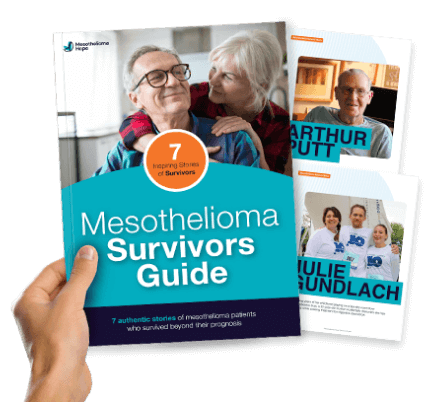Can Mesothelioma Go Into Remission?
Yes, mesothelioma can go into remission. This happens when tumors shrink by at least 50% or when no visible signs of cancer remain. Doctors call this state no evidence of disease (NED). Some mesothelioma patients have achieved NED status for 20 years or longer.
Many patients wonder if remission means the cancer is “cured.” A cure means the cancer will never come back, but remission means the cancer is under control and may return in the future. Remission is like turning the cancer off for a period of time, while a cure would mean it’s gone forever.
Complete mesothelioma remission may not happen for everyone, but the odds are higher if the cancer is caught before it can spread to other areas of the body. In early-stage mesothelioma, it’s easier to remove or shrink tumors with surgery, chemotherapy, and radiation.

“I tell people that they have to look at this as a condition that is going to be with them for the rest of their lives. But I’ve had people go for 10 or 15 years with no evidence of any disease in their bodies.”
Types of Mesothelioma Remission
Remission refers to a period when the signs and symptoms of mesothelioma improve or disappear.
There are two types of mesothelioma remission:
- Partial mesothelioma remission occurs when the cancer shrinks but doesn’t completely go away. In partial remission, tumors decrease in size by at least half. Some mesothelioma symptoms may improve as well.
- Complete mesothelioma remission happens when all signs of mesothelioma are gone and tests show no evidence of disease. However, this does not necessarily mean the cancer is cured — it can still be present in the body at undetectable levels.
Stable disease occurs when the cancer isn’t growing or spreading, but it also hasn’t shrunk. In this case, the disease is under control, and symptoms may stay the same without getting worse.
Get our Free Mesothelioma Guide to learn about treatments that can help you or a loved one achieve remission.
What Is Mesothelioma Recurrence?
Mesothelioma recurrence is when signs of cancer return after a period of remission. This can happen because cancer cells that were undetectable during remission begin to grow again.
There are three types of recurrent mesothelioma:
- Local recurrence is when the cancer returns to the exact location where it originally developed.
- Regional recurrence happens when the cancer reappears in nearby organs or tissues.
- Distant recurrence is when the cancer develops in a completely different part of the body, such as the lungs, liver, or lymph nodes.
If you’re in remission, make sure you’re attending regular follow-up appointments and watching for any symptoms of mesothelioma recurrence. Follow-up care usually includes imaging scans (like CT or PET), blood work, and physical exams every few months.

“You have options — even if you feel like you don’t. While there may be limited FDA-approved treatment options for mesothelioma recurrence, now would be the time to seek out a clinical trial and schedule consultations with top mesothelioma researchers.”
Treatments to Promote Mesothelioma Remission
Mesothelioma surgery is the most effective way to remove mesothelioma tumors and improve the chances of remission. Patients diagnosed in the early stages of mesothelioma are more likely to qualify for curative (life-extending) surgeries that could lead to remission.
The main curative surgeries for pleural mesothelioma are:
- Extrapleural pneumonectomy (EPP), where a surgeon removes all visible tumors by extracting the cancerous lung and any nearby tissue
- Pleurectomy with decortication (P/D), which removes the cancerous lung lining and any mesothelioma tumors on the surface of the lung
The main curative surgery for peritoneal mesothelioma is:
- Cytoreduction with HIPEC, where the cancerous lining of the abdomen is removed and hyperthermic intraperitoneal chemotherapy is then applied to kill any remaining cancer cells
While surgery alone can help some patients achieve remission, most specialists recommend combining it with chemotherapy, immunotherapy, or radiation in what’s known as multimodal therapy.
Treatment Options After Mesothelioma Recurrence
When mesothelioma cancer returns, doctors may recommend different treatment options than those used the first time. Your treatment plan may include one or more of the following therapies.
Chemotherapy
Mesothelioma chemotherapy uses drugs to kill cancer cells. For patients with recurrent mesothelioma who haven’t had chemotherapy, it may be recommended as a second-line (follow-up) treatment.
Doctors often use a combination of drugs like pemetrexed (Alimta®) with either cisplatin or carboplatin.
If you’ve already received chemotherapy, your doctor may try changing the drug combination to help slow the cancer and manage symptoms.
Immunotherapy
Immunotherapy has emerged as a promising approach for treating mesothelioma recurrence. It works by enhancing the immune system’s ability to identify and attack mesothelioma cells.
Mesothelioma specialists may recommend the immunotherapy drugs nivolumab (Opdivo®) and ipilimumab (Yervoy®) for patients whose cancer has returned after initial treatment.
In one case, a patient achieved complete remission from peritoneal mesothelioma with immunotherapy as a first-line treatment. He was still in remission 3 years after treatment.
Targeted Therapy
Targeted therapies work by blocking specific molecules that help cancer grow and spread.
One example is bevacizumab (Avastin®), which stops tumors from making new blood vessels, cutting off their supply of nutrients.
Radiation Therapy
As part of a mesothelioma recurrence treatment plan, radiation therapy is used to shrink tumors and reduce pressure within the chest or abdomen.
This can help slow the spread of cancer and improve the quality of life for patients facing recurrence.
Clinical Trials
Cancer centers nationwide are conducting clinical trials to treat patients fighting mesothelioma recurrence.
Two of these trials include:
- CTX131 for Relapsed Mesothelioma: Doctors are currently testing an engineered T-cell therapy called CTX131™ in patients with recurrent or treatment-resistant pleural mesothelioma.
- Donor Immune Cells + Chemotherapy: Researchers are using boosted immune cells taken from donated cord blood and combining them with two chemotherapy drugs, cyclophosphamide and etoposide. The goal is to see if this combination can better manage mesothelioma recurrence.

Our Oncology Nurse Navigator Liz Logan can help you or a loved one find the right clinical trial and start the enrollment process. Use our free trial matching service to get started.
Steps to Improve Your Chances of Mesothelioma Remission
Acting quickly after a mesothelioma diagnosis can help your body fight cancer and work toward remission. Find out what steps to take below.
- See a specialist. Because this cancer is so rare, it’s important to see a specialist who has experience diagnosing and treating patients with mesothelioma. Getting cancer treatment from a mesothelioma specialist can improve your life expectancy and give you a better chance of achieving remission.
- Explore emerging therapies. New and emerging treatments can help reduce the size of mesothelioma tumors, manage symptoms, and possibly send your cancer into remission.
- Prioritize your emotional health. Managing stress through counseling sessions and support groups can improve your overall well-being, boost your immune system, and support your chances of achieving and maintaining remission.
- Focus on nutrition. Proper diet and nutrition can strengthen your immune system, boost your energy levels, and improve your overall well-being.
- Incorporate exercise. Gentle physical activity like walking or yoga can ease some of the side effects of mesothelioma treatment, help you sleep better, and lower your stress levels.

“I can’t stress it enough — seeing a surgeon and a medical oncologist who can manage this disease is so important. We can offer things that maybe somebody in the community can’t.”
Mesothelioma Remission Cases
Many mesothelioma survivors have achieved long-term remission or stable disease status and far outlived their life expectancies.
- Julie Gundlach (19+ year survivor). Julie has been in stable disease since 2014, allowing her to concentrate on her life rather than her illness.
- John Panza (13+ year survivor). EPP surgery helped John achieve long-term mesothelioma remission for nearly 7 years. He had a recurrence in 2019 but is still alive today.
- Mary Jane Williams (15-year survivor). Mary Jane was cancer-free for 14 years after chemotherapy and cytoreductive surgery. She passed away from Alzheimer’s complications in 2018.
- Paul Kraus (27-year survivor). Paul was the longest-living mesothelioma survivor, reaching stable disease status with both standard mesothelioma treatments and alternative therapies.
With advancements in treatment and ongoing clinical trials, more patients may have the chance to achieve mesothelioma remission.
Get our Free Survivors Guide to hear from 9 patients who beat the odds and are still thriving 15+ years after their mesothelioma diagnosis.
Get Help Achieving Mesothelioma Remission
While mesothelioma is an aggressive cancer, there are steps you can take to improve your life expectancy and potentially achieve remission. Mesothelioma Hope is here to support you through it.
Our team of Patient Advocates can:
- Connect you with top mesothelioma specialists
- Help you find the right clinical trial
- Provide information on the latest treatment options
- Share support resources with you and your family
Call us at (866) 608-8933 or get our Free Mesothelioma Guide for personalized guidance and support.
Mesothelioma Remission and Recurrence FAQs
Does mesothelioma ever go into remission?
Yes, mesothelioma can go into remission, although it’s rare. Remission means doctors can’t find any signs of cancer after treatment.
Unfortunately, because this disease is so aggressive, there’s still a high chance it might return. Treatments like surgery, chemotherapy, radiation, and immunotherapy can help some people reach mesothelioma remission, which may last for several months or even years.
Does mesothelioma always come back?
Not always. While this cancer is known to be aggressive, many patients are able to reach remission, and for some, that remission can extend into several years.
Advances in treatments like surgery, chemotherapy, radiation, and immunotherapy are giving patients more opportunities than ever to live longer, fuller lives.
Has anyone beat mesothelioma
While no one has ever been cured of mesothelioma, some patients have responded exceptionally well to treatment. As a result, they’ve enjoyed extended periods of remission and an improved quality of life.
Support from loved ones and a positive mindset also play crucial roles in the recovery process. While mesothelioma is a serious illness, ongoing research and new treatment options continue to offer hope for complete recovery.
What can I expect from mesothelioma remission?
If your mesothelioma goes into remission, it means that the cancer has either reduced or disappeared. Chest pain, shortness of breath, and other symptoms of mesothelioma may improve or go away completely.
During remission, it’s important to maintain a healthy lifestyle and avoid known risk factors such as smoking. Your emotional well-being is also crucial — staying connected with family, friends, and support groups can provide hope and a sense of community.
Remember, every mesothelioma journey is different. Some people stay in remission for many years, while others focus on keeping the cancer controlled and living as fully as possible. Both paths are valid, and support is available no matter where you are in the process.






